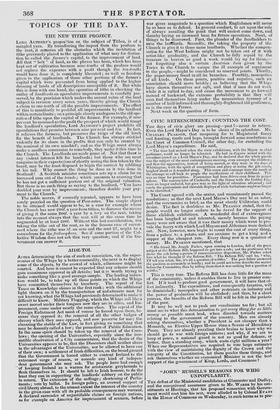AIDE-TOL
AFTER determining the aim of such an association, viz. the super- session of the Whigs by a better commodity, the next is to display some of the objects, by the avowal of which, adherence might be courted. And here it cannot be expected that any scheme should gain unanimous approval in all details; but it is worth trying to make something like a good average sample. The leading indica- tion would be, to take up all those points on which the Whigs have committed themselves by treachery. The repeal of the Taxes on Knowledge shines in the first rank; with the additional light thrown on it by the transportation of unfortunate men for not knowing, what the Whigs had previously determined to make it difficult to know. Military Flogging, which the Whigs roll like a sweet morsel under their tongues now they arc in office, and Im- pressment, come under nearly the same class. The repeal of the Foreign Enlistment Act must of course be forced upon them, be- cause they opposed it; the removal of all the other badges of slavery which they once opposed, and now preserve for use; the cleansing the stable of the Law, in fact giving us something that may be decently called a law; the promotion of Public Education. In the same spirit should be taken up the removal of the Corn- laws ; the opening of the Universities, especially since the irre- sistible observation of a City commentator, that the desire of the Universities appears to be, that the Dissenters shall neither share in the advantages of the Universities, nor be allowed to have one of their own; a settlement of Irish difficulties, on the broad ground that the Government is bound either to content Ireland to the extremest verge of reason, or concede any kind of indepen- dent government she may ask. The people have had enough ' of keeping Ireland as a warren for aristocratic greyhounds to flesh themselves in. It should be left to Irish honour, to do the least they can in supporting the landlords' robbery on the public in return. The extension of the suffrage ; shortening of Parlia- ments; vote by ballot. In foreign policy, an avowed support of civil liberty abroad, to the utmost extent the interest of the country in the given case with all its probable consequences may warrant. A declared surrender of unjustifiable claims on foreign nations, as for example on America for impressment of seamen, before
war gives magnitude to a question which Englishmen will never be so base as to defend. In general conduct, to act upon the rule of always assailing the point that will easiest come down, and thereby laying an increased base for future operations. Next, of
things to be disavowed. First, the plunder of the fundholders to save the landlords. Secondly, the taking the property of the Church to give it to those same landlords. Whether the compen- sation for the West Indians might not be taken out of it with artist-like graduality, and the Church be fully repaid by the treasure in heaven so good a work would lay up for them,— not fbrgetting also a certain Austrian loan given by the Tories to the Church to escape the ill example of repayment to the people,—might be considered as reserved points. Thirdly, the paper-money fraud in all its branches. Fourthly, monopolies of all kinds. On these points, positive and negative, such an association should move briskly ; as believing that the Whigs have shown themselves not safe, and that if men do not work while it is called to-day, and cause the movement to go forward instead of backward, the extreme probability is that they will soon find themselves lying under the measureless tyranny of a number of half-informed and thoroughly-frightened 'old gentlemen, as is the case in France.
Next week on the question of form.




















 Previous page
Previous page